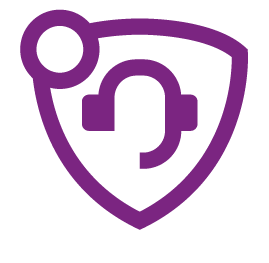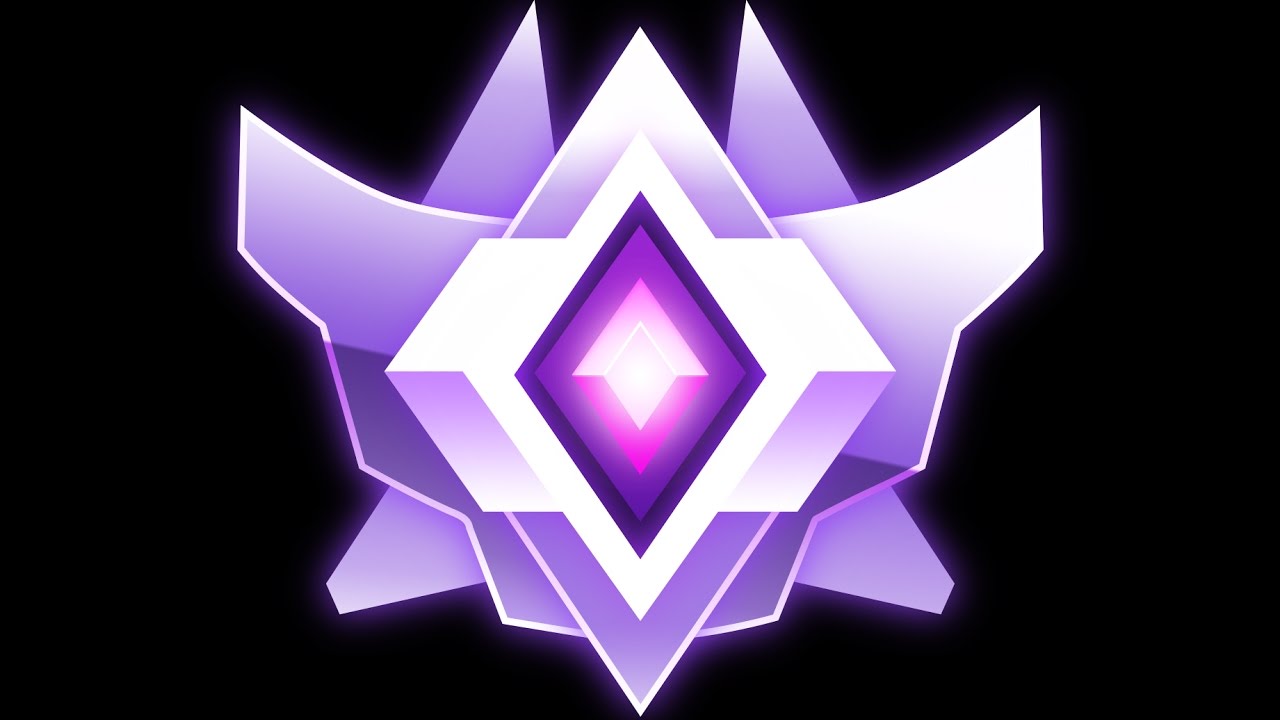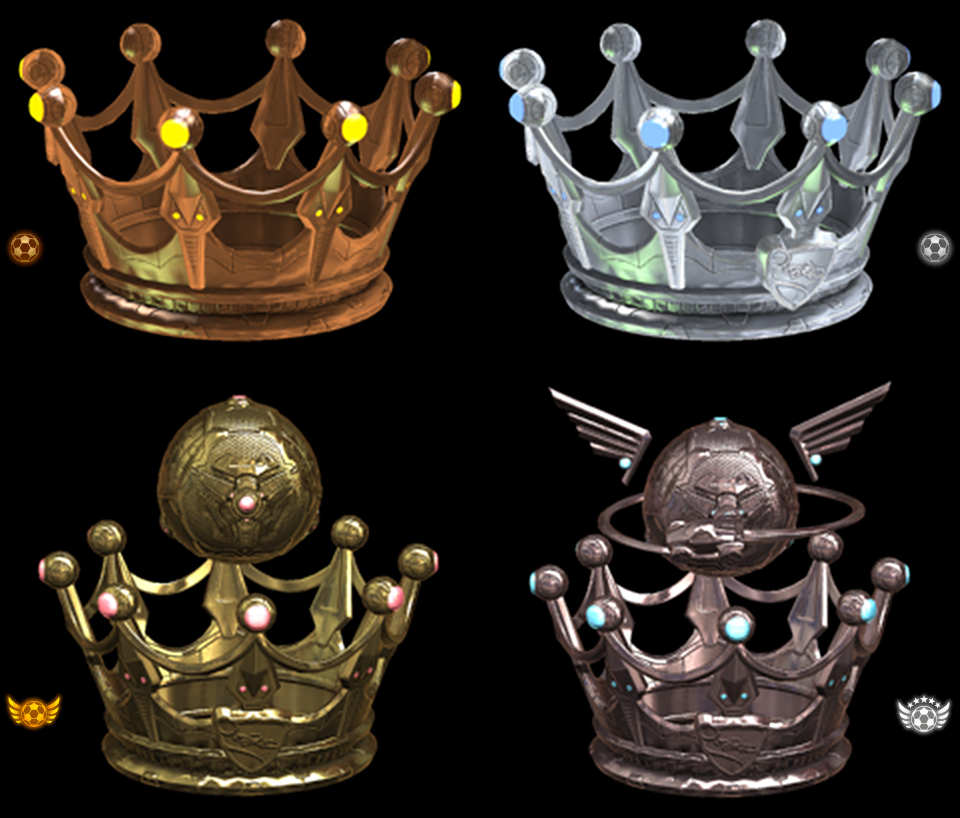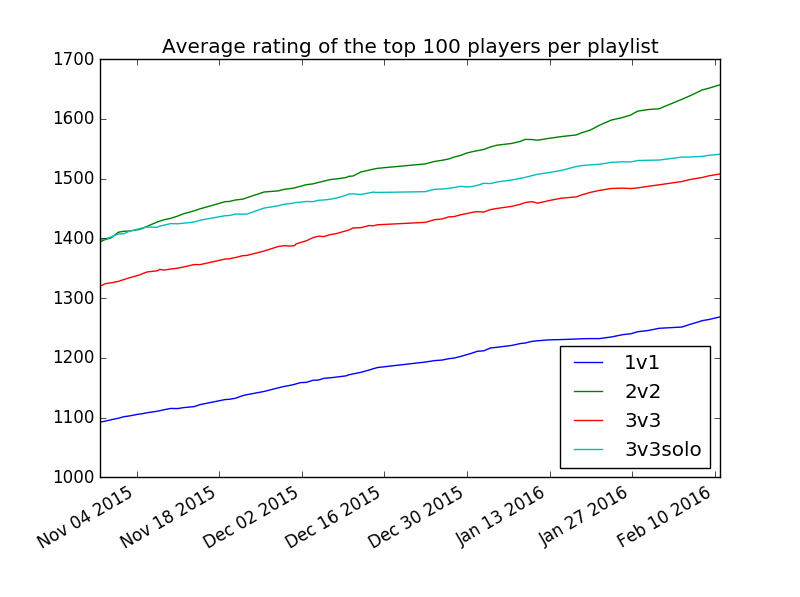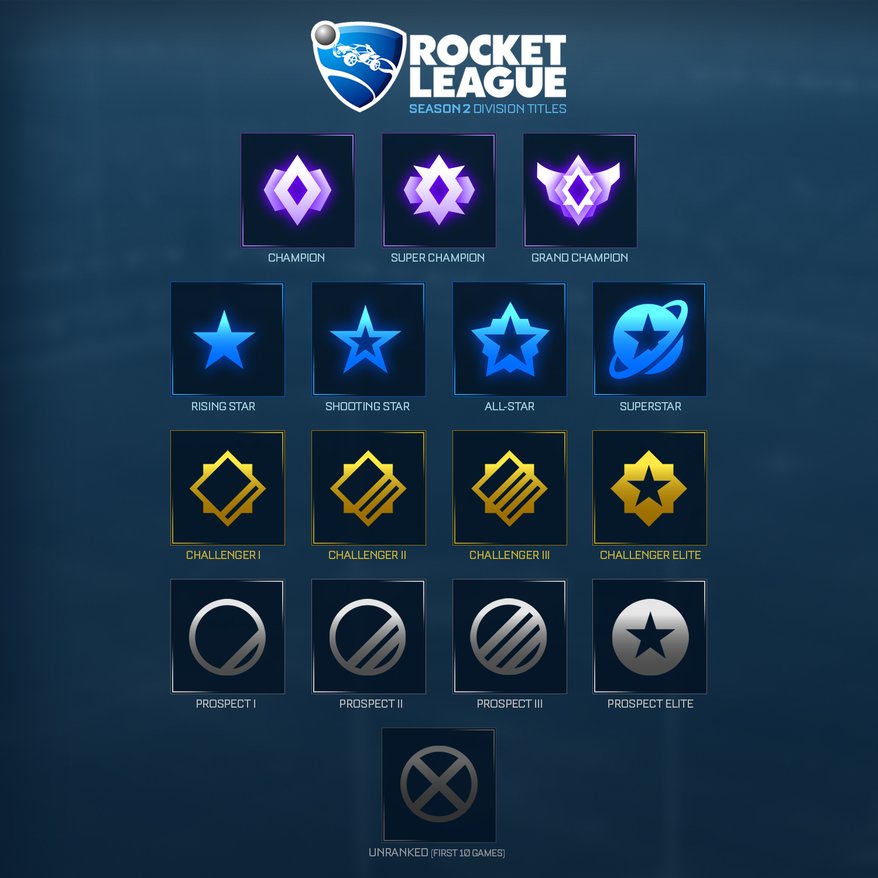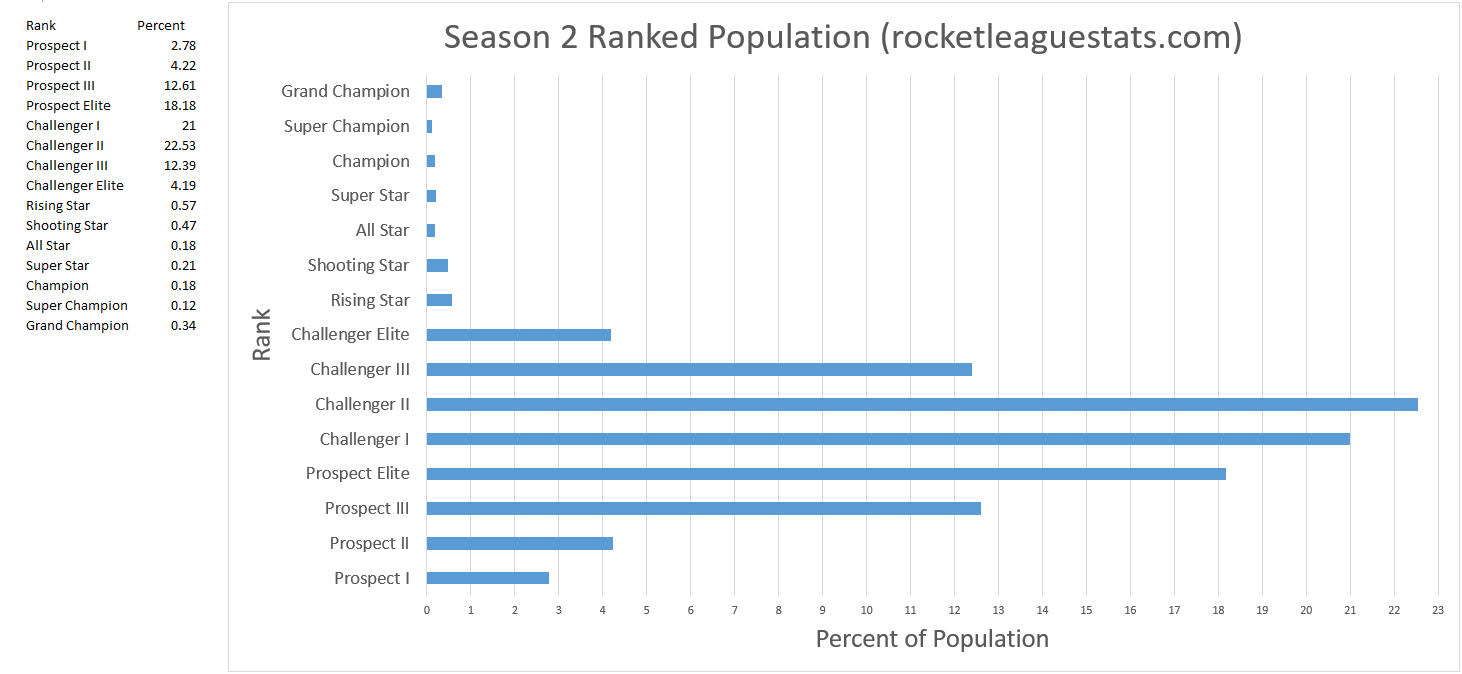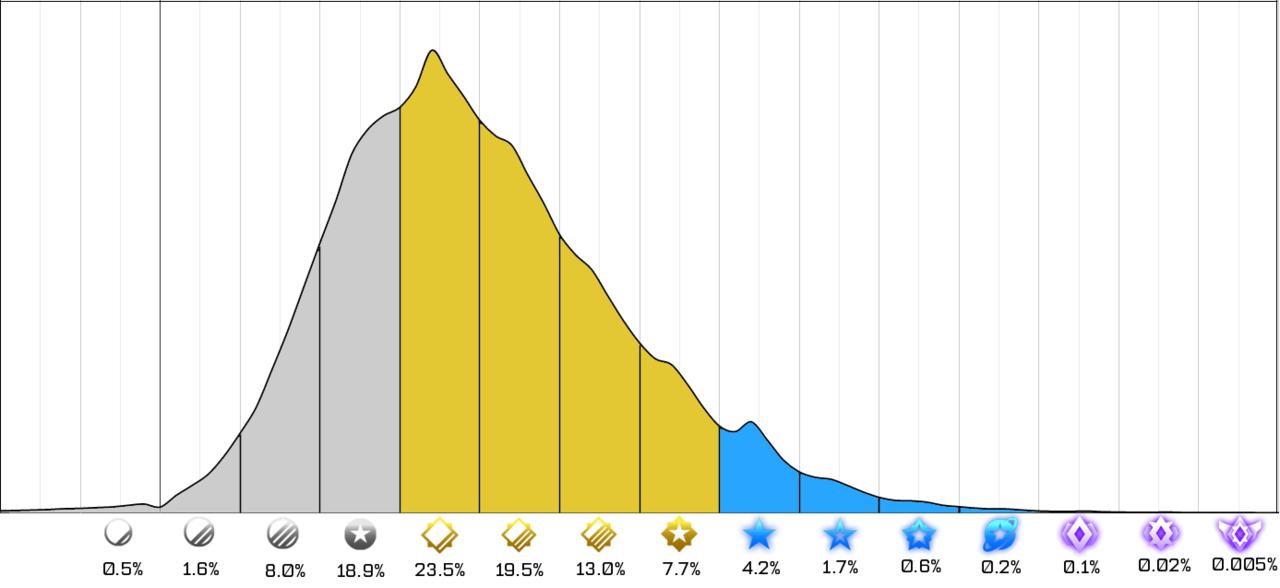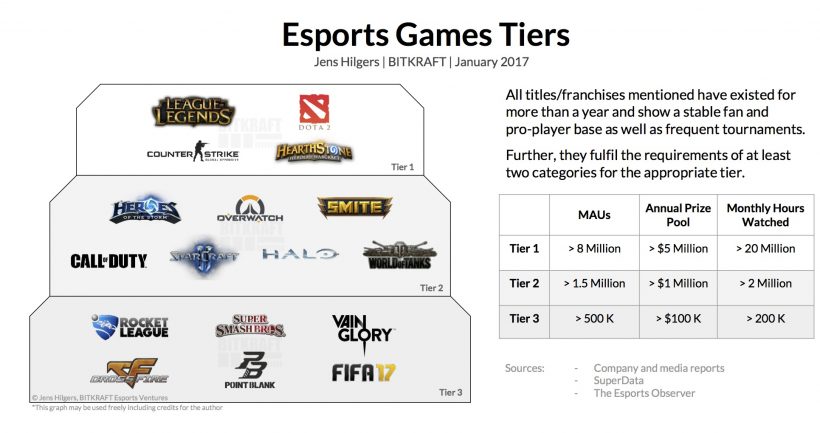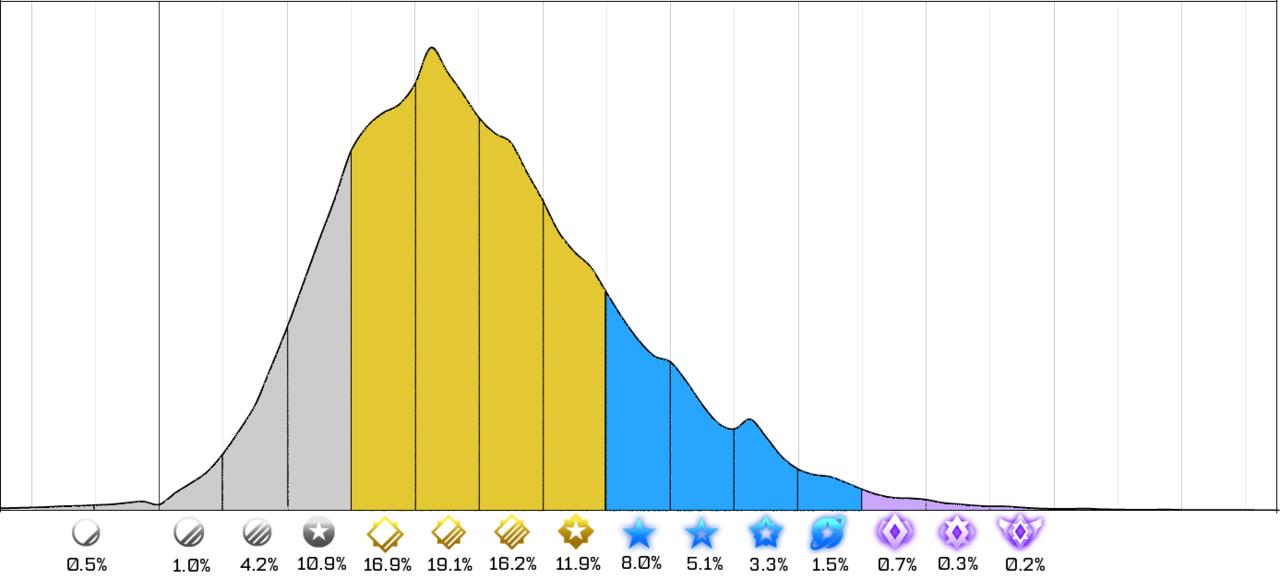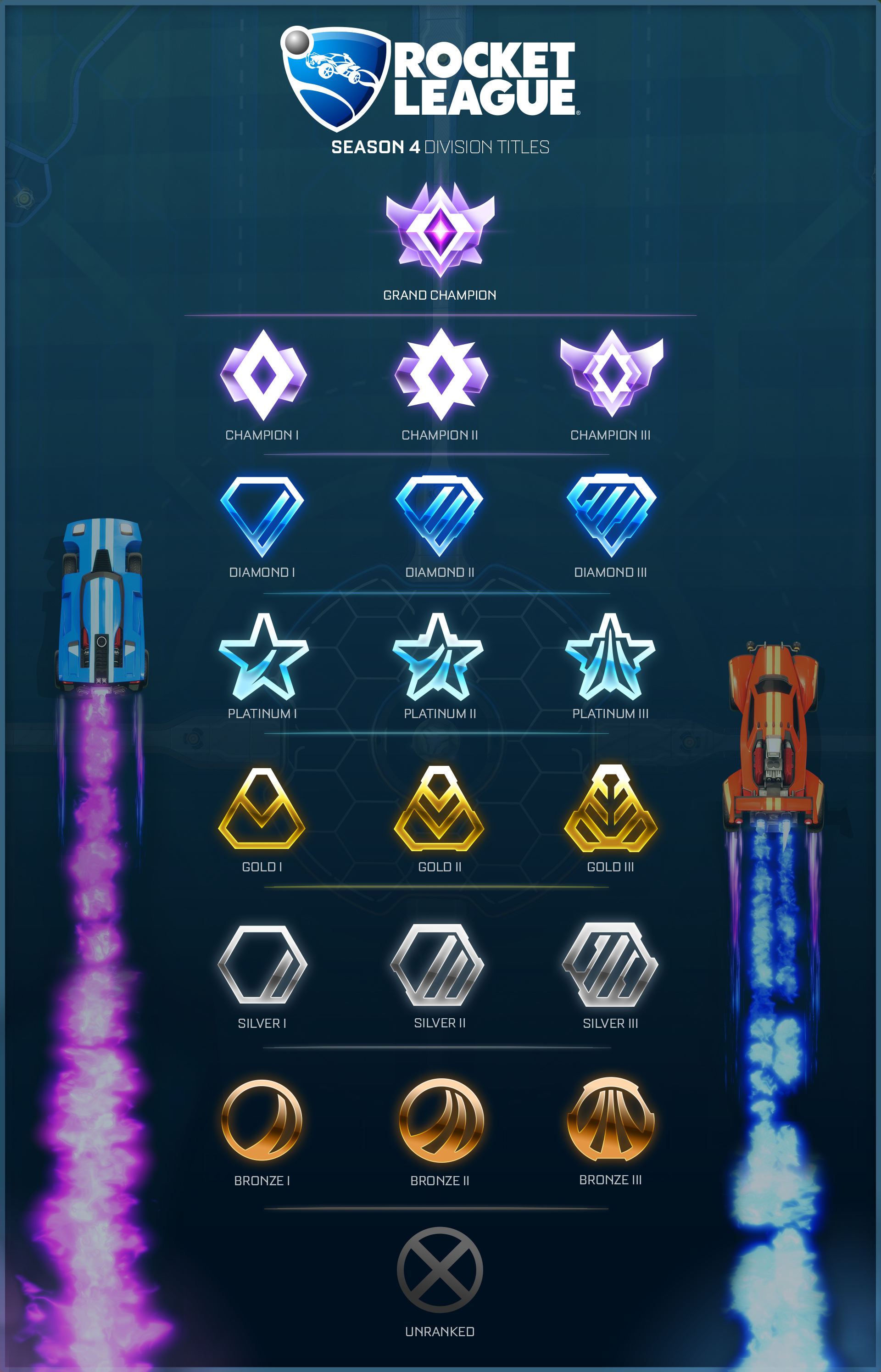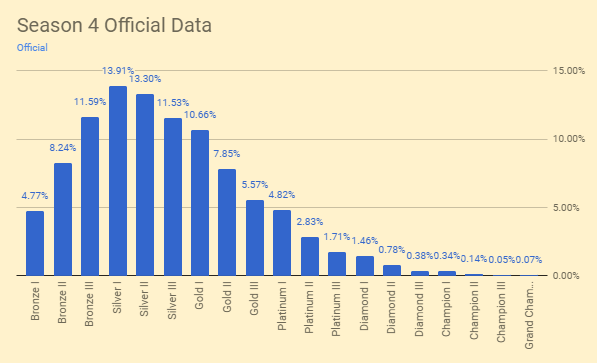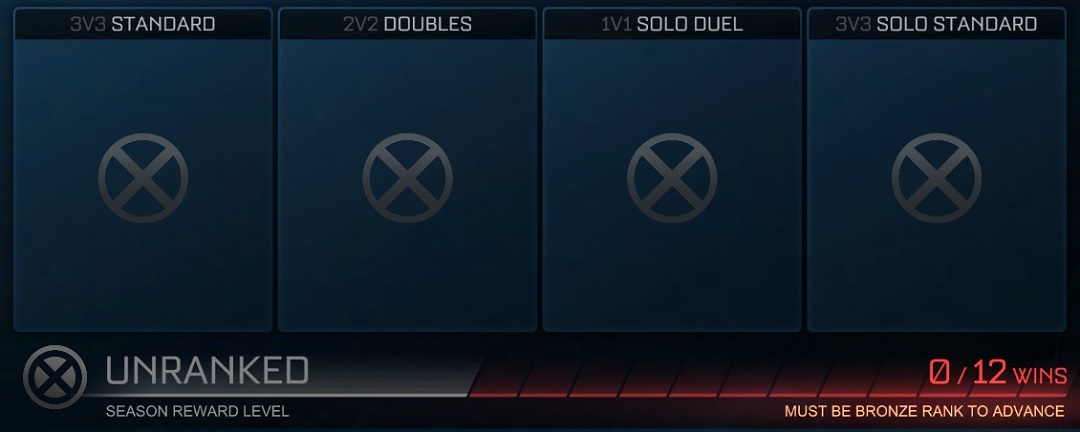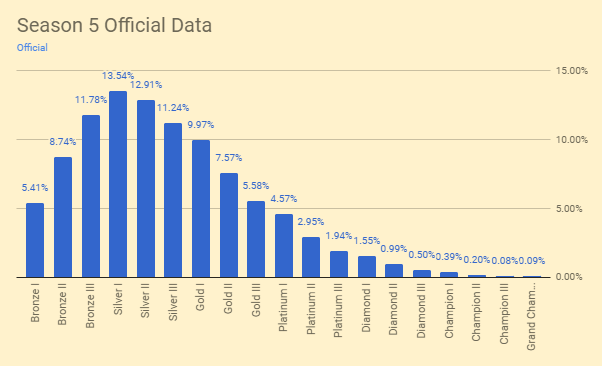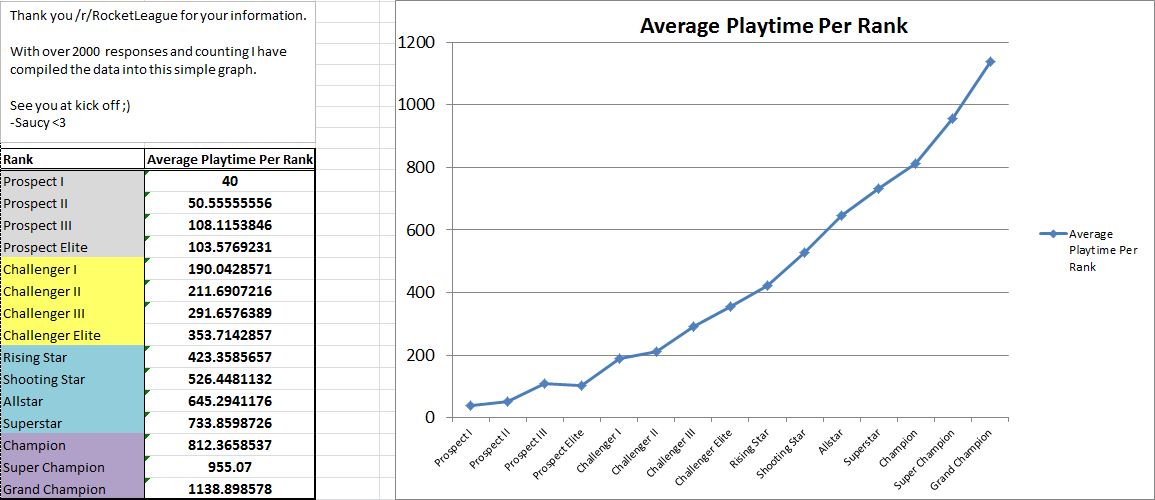The Rocket League Ranking System. If you have been a long-term player of Rocket League, you are aware of all the changes to the ranking system and the names and designs of the Rocket League Ranks over the seasons. If you are new to the game, you may not be aware of the changes made over time to the competitive system. In today’s post, I’m going to go through the rich history of the Rocket League Ranking System. I’ll go over the changes, such as the controversial season 3 changes, the switch from RP to MMR, the seasonal distributions, and even the growth of the game. I’ll go through several charts and draw equivalencies so you can see what you would have been in other seasons if you were playing in them at your current tier. I’ll even provide an hrs to rank correlation so you can benchmark yourself to common rank growth over time. So now let’s get started. I hope you enjoy this one brought to you by Rocket League Coaching Discord :).
Rocket League Ranking System
Contents
- 1 Rocket League Ranking System
- 2 Rocket League Season 1
- 3 Rocket League Season 2
- 4 Rocket League Season 3
- 5 Rocket League Season 4
- 6 Rocket League Season 5
- 7 Rocket League Season 6
- 8 Rocket League Season 7
- 9 Rocket League Season 8
- 10 Comparing the Rocket League Ranking System – Season 2 to Season 6 Translations
- 11 Assessing Your Progression – A Game Time Hrs to Rank Correlation Survey
- 12 Closing Thoughts on the History of the Rocket League Ranking System
- 13 Creator Bio of Rocket League Ranks Article
Rocket League Season 1
Start Date: September 08, 2015
End Date: February 11, 2016
Start Date Avg Players: 17,439
End Date Avg Players: 25,699
Start Date Peak Players: 34,391
End Date Peak Players: 50,369
RLCS Season 1 Champions: IBuyPower (Kronovi, Lachino, Over Zer0)
Rocket League Season 1 Rewards: Topper
Ah season 1. I remember these days fondly when I was noob thinking I was a god sitting in low silver ranks before I learned about Rocket League Coaching Discord. Back in those days, Rocket League used an RP system instead of the current MMR system you are familiar with today. The RP system was pretty confusing back then as points earned and lost were based on your expected win probability and based on the team’s average points versus the competition.
Rocket League Season 1 Competitive Tiers
Early Rocket League did not have many tiers. There were only 3 you would rank up for and the highest tier was just reserved for the top 100 players. Below were the tiers of Season:
- Bronze
- Silver
- Gold
- Platinum (reserved for top 100 players)
The Rocket League Rank Point Controversy and Transition to Match Making Rating (MMR)
According to Psyonix Corey, ranked play was a late addition to the game and they anticipated issues with the ranking system. In response to the confusion and frustration with the system, Psyonix switched to a points or MMR system similar to games like League of Legends. So after Season 1, players would gain and lose points scaled by your MMR. The visibility of your actual points was also taken away in later seasons. Back in Season 1, you could see your rank points or RP every game and known when you were going to rank up. In future seasons, only Grand Champions were privileged to see their skill points and the only way one could access their points real-time would be to use a tracker like RL Tracker Network, in-game apps like Overwolf, or mods like Alpha console.
These third party tools would report the skill rating (SKR) not MMR. The MMR of players would be hidden in game and would be used to compare with other players when the server is looking for other players when setting up matches.
The Early Days of Rocket League Competitive Play
These were the early days of Rocket League. An explosion of the game occurred when Rocket League was released for free through PlayStation Plus and many of us who joined the game on the July 7. 2015 PS4 Plus release date remember the server problems the game had trying to handle all the new players. There were also these players who were seemingly gods already at the game because they had played the unknown original game, Supersonic Acrobatic Rocket-Powered Battle Cars or SARPBC. These veterans, like Kronovi, propelled themselves to the top of the leaderboards and many competed in the first Rocket League Series Championship (RLCS). Some beta footage by Kronovi is shown below:
Rocket League Season 1 Rank Distribution
Unfortunately, this is the only Rocket League Season I could not find distribution stats for. However, I do have a nice chart on the average rating of the top 100 players (Platinum rank) over time throughout the season. 2s proved to have the highest rating nearing 1700 while 1v1 represented the lowest at slightly over 1200 at the end of the season.
Rocket League Season 2
Start Date: February 11, 2016
End Date: June 20, 2016
Start Date Avg Players: 25,699
End Date Avg Players: 26,120
Start Date Peak Players: 50,369
End Date Peak Players: 55,029
RLCS Season 2 Champions: FlipSid3 Tactics (Markydooda, kuxir97, gReazy)
Rocket League Season 2 Rewards: Rocket Boost
The Rocket League ranking system was completely overhauled in Season 2. Psyonix had implemented an MMR points system so now progression was tied to a more skill based progression system versus the points based progression system of Season 1. The ranks were also expanded with new icons for each rank.
Rocket League Season 2 Competitive Tiers
Season 2 originally started with 12 tiers. The Superstar division you see in the above picture was called Champion. Later in the season, the Rocket League ranking system update split up players into 15 competitive tiers. The new tiers graphics are shown above and the names of the tiers are shown below:
- Unranked
- Prospect I
- Prospect II
- Prospect III
- Prospect Elite
- Challenger I
- Challenger II
- Challenger III
- Challenger Elite
- Rising Star
- All-Star
- Superstar
- Champion
- Super Champion
- Grand Champion
The new update also split these tiers further into 5 divisions. Promotion would not occur back then until you got to division 2 of the new tier. Demotion for tiers would work similar where you would not demote until you hit division 4 of the prior tier. This did lead to some complaints about the Rocket League competitive system feeling harder to progress, which is why in later seasons you only see 4 divisions instead of 5.
Season 2 launched starting everyone out as unranked and attempted to line everyone up to the appropriate new rank. Below were the initial ranks from season 1 to season 2:
| SKILLRATING | TITLE | OLD TITLE | OLD RANK |
|---|---|---|---|
| 0 | UNRANKED | UNRANKED | |
| 250 | PROSPECT I | UNRANKED | |
| 500 | PROSPECT II | BRONZE1 | |
| 750 | PROSPECT III | BRONZE1 | 100 |
| 1000 | PROSPECT ELITE | BRONZE2 | 200 |
| 1250 | CHALLENGER I | BRONZE3 | 300 |
| 1500 | CHALLENGER II | SILVER 1 | 400 |
| 1750 | CHALLENGER III | SILVER 2 | 500 |
| 2000 | CHALLENGER ELITE | SILVER 3 | 600 |
| 2250 | RISING STAR | GOLD 1 | 700 |
| 2500 | ALL-STAR | GOLD 2 | 800 |
| 2750 | SUPERSTAR | GOLD 3 | 900 |
| 3000 | CHAMPION | GOLD 3 / PLATINUM | 1000+ |
Rocket League Competitive Play – Rocket League Series Championship 2 (RLCS)
RLCS season 2 saw the rise and dominance of the European server teams. Since the beginning of Rocket League, teams like IBuyPower and Kings of Urban (now NRG) dominated tournaments. RLCS season 2 was EU’s time with an all EU final of Mock-It Esports vs. FlipSid3 Tactics. FlipSid3 brought with them the rotational theory that is now popular today. In the early days of Season 1, players like Gibbs were specialists. As the skill level of pros increased dramatically, pros were expected to be all-rounders and rotational theory popularized by FlipSide3 now become the new meta in competitive play. Armed with more experience in LAN play and an EU friendly crowd with the venue being hosted in Amsterdam, FlipSid3 came and dominated RLCS Season 2 and took the crown establishing the EU dominance in competitive play that we would see in Season 3 and 4 of RLCS.
Rocket League Season 2 Rank Distribution
Rocket League Season 2 provided us with the first inside look at the stats where one could gauge where they were at compared to the total population of server. The best stats we had back then was rocketleaguestats and below was taken from the 3rd party site near the end of the season:
We can also go off Psyonix’s official graph released at the beginning of the Season 3 ranking changes:
So to break this down in top player percentages here is where you would stood in Season 2 based on rank:
| Rank | Percentage |
|---|---|
| Prospect I | Top 99.53% |
| Prospect II | Top 97.03% |
| Prospect II | Top 97.43% |
| Prospect Elite | Top 89.43% |
| Challenger I | Top 70.53% |
| Challenger II | Top 47.03% |
| Challenger III | Top 27.53% |
| Challenger Elite | Top 14.53% |
| Rising Star | Top 2.63% |
| All Star | Top 0.93% |
| Super Star | Top 0.33% |
| Champion | Top 0.13% |
| Super Champion | Top 0.03% |
| Grand Champion | Top 0.01% |
Rocket League Season 3
Start Date: June 20, 2016
End Date: March, 22, 2017
Start Date Avg Players: 26,120
End Date Avg Players: 33,763
Start Date Peak Players: 55,029
End Date Peak Players: 74,330
RLCS Season 3 Champions: Northern Gaming (Reemko, Deevo, Turbopolsa)
Rocket League Season 3 Rewards: Wheels
Rocket League Season 3 begin a resurgence in Rocket League popularity. A number of changes occurred to the game that created new buzz in the game including new game modes, the introduction to crates, and increased popularity of RLCS. A huge change in the rank system also created controversy as to what defines a Grand Champion.
The Introduction of the Rocket League Crate System
On September 8, 2016, Psyonix released a new crate system that allowed players to obtain new items that could be unlocked using keys that were available to purchase in-game. Prior to the crate release, the only in-game purchases were DLC Rocket League Cars like the Fast and Furious cars and the Supersonic Fury DLC pack. Now, the majority of new car bodies would be released through the crate system and an explosion of trade sites and communities popped up. For the most part, the crate system was welcomed with open arms, but some Youtubers like NeatMik, warned against the loot box system; but supported Psyonix’s reasoning for implementing the system.
It was only a matter of time that a loot box system would hit the game as the proceeds of the game were being used to fund the ever-growing popularity of Rocket League E-Sports. Rocket League training also exploded with new comers wondering how to trade in Rocket League and how to get the best deals.
Rocket League Competitive Play – Rocket League Series Championship 3 (RLCS)
Psyonix in listening to its fan feedback about better tournament formatting, announced major investments into Rocket League Esports. The Company announced that it would invest $2,500,000 into Rocket League Esports in 2017 to support RLCS, community-run tournaments, console tournaments, and even a collegiate league.
RLCS season 3 debuted with the largest ever prize pool for a Rocket League Esports tournament at $150,000. Rocket League had officially jumped into the Tier 3 category of Esports and there was discussion in the esports world if Rocket League could growth into a Tier 2 Esports title by the end of 2017 or early 2018. To provide further insight on the Esports game tiering, Jens Hilgers, the CEO of DOJO Madness and Founding partner of BITKRAFT Esports Ventures categories Esports titles into 3 tiers:
- Tier 1 – Annual Prize Pool of Over $5 million
- Tier 2 – Annual Prize Pool of Over $1 million
- Tier 3 – Annual Prize Pool of Over $100,000
Rocket League Esports had risen to the same ranks as Super Smash Bros and FIFA. The investment from Psyonix was paying off.
Season 3 of RLCS included Oceanic (OCE) teams for the first time. NRG finally got over the hump defeating their first EU team in the RLCS LAN and defeating season 2 world champions F3. There was also an unknown team that came out and surprised everyone called The Leftovers. RLCS analyst Gibbs gave Leftovers only 1 game in his prediction against F3 and they surprised everyone with a dominant 3-1 performance.
Despite the NA home advantage with the venue being hosted in Los Angeles, EU once again continued their domination. 3 of 4 teams in the final 4 were EU and the final became another all EU final with Mock-It once again finishing second and Northern Gaming taking the crown.
Rocket League Season 3 Rank Change
On October 11, 2016, Psyonix once again made changes to the Rocket League ranking system. After hearing feedback from the community about how difficult it was to hit the higher competitive tiers in rank play, Psyonix made a change to the ranking system to allow more players into the high star and champ rankings. It was a very sizable change where Season 2 All-Stars and Superstars were now competing for Grand Champion ranks. You can see the before and after changes below.
Before the October 11, 2016 Update
After the October 11, 2016 Update
Rocket League Season 3 Ranking Distribution Stats
Rocket League Season 3 was a very controversial competitive season for ranked play. It was the easiest of all seasons to hit Grand Champion and Champion rank. According to Psyonix Corey, the ending Season 3 GC rate in the 2v2 playlist was 0.3%. This essentially meant that anyone who got Champ rank and up in Season 2 could be propelled to a Grand Champion in Season 3. Below is the most accurate stat distribution table we could find as there were no official stats from Psyonix available for the end of Season 3:
| Rank | Percentage |
|---|---|
| Prospect I | Top 100% |
| Prospect II | Top 99.50% |
| Prospect II | Top 98.50% |
| Prospect Elite | Top 94.30% |
| Challenger I | Top 83.40% |
| Challenger II | Top 66.50% |
| Challenger III | Top 47.40% |
| Challenger Elite | Top 31.20% |
| Rising Star | Top 19.30% |
| All Star | Top 6.20% |
| Super Star | Top 2.90% |
| Champion | Top 1.40% |
| Super Champion | Top 0.70% |
| Grand Champion | Top 0.40% |
As you can see in the breakdown, the Champ wheel rewards only required you to be in the top 1.40%. The Season 3 Grand Champion title really lost its value here as you will see in the future season rank updates.
Rocket League Season 4
Start Date: March, 22, 2017
End Date: July 5, 2017
Start Date Avg Players: 33,763
End Date Avg Players: 35,006
Start Date Peak Players: 74,330
End Date Peak Players: 68,232
RLCS Season 4 Champions: Gale Force Esports – GFE (Reemko, Deevo, Turbopolsa)
Rocket League Season 4 Rewards: Trail
Rocket League Season 4 had several major changes to the Rocket League ranking system in what became the most difficult and trying season of competitive rocket play yet.
Rocket League Ranks Season 4 Changes
Rocket League Season 4 overhauled the ranking icons. Instead of the star and champ naming system, Season 4 ranks used a more standardized format similar to games like League of Legends.
The new ranking system split up players into 19 competitive tiers. The new Rocket League Ranks from lowest to highest are shown above and are outlined below:
- Unranked
- Bronze I
- Bronze II
- Bronze III
- Silver I
- Silver II
- Silver III
- Gold I
- Gold II
- Gold III
- Platinum I
- Platinum II
- Platinum III
- Diamond I
- Diamond II
- Diamond III
- Champ I
- Champ II
- Champ II
- Grand Champion
In addition, the division system went from 5 divisions down to 4. You no longer had to be in division 2 to be promoted. You were now promoted when you hit the division I for the new tier. The main expansion into the ranking system was the Diamond level tier, which created 3 new tiers for players to challenge until they would hit the coveted Champion and Grand Champion tiers.
Rocket League Competitive Play – Rocket League Series Championship 4 (RLCS)
RLCS Season 4 kicked off in Washington D.C. with incredible hype. After the huge success of RLCS season 3, Psyonix had proven that Rocket League was a legit ESport. Venues such as Dream Hack now sponsored a Rocket League tournament and offered a $100,000 grand prize.
New blood came into the series this season as younger players aged into the competitive age minimum and the resurgence of NA was imminent as Cloud 9 exploded onto the scene with big wins at Dream Hack and X Games.
PSG Sponsors a Rocket League team, the Rise of OCE, NA rises again, and the return of the King
The most exciting RLCS to date had a number of great developments for the series. PSG, a professional French football team became the first real sports team to create and sponsor a Rocket League team in RLCS. Comprised of some of the youngest players in the LAN, PSG anchored their team with Ferra, the surprise MVP of the Leftovers from Season 3.
OCE entered RLCS once again, with Chefs eSports Club leading the way and shocking everyone at the LAN with a dominant upset victory against NRG. NA pride was damaged, but not out as this was the Season where NA would rise again to the competitive ladders. G2 finally got its team mojo working and Cloud9 challenged to get 2 NA teams in the final four.
However, EU continued to be dominant, with Gale Force ESports and Method going head to head in the final round. Gale Force, led by RLCS Season 3 World Champion Turbopolsa went undefeated in LAN. Turbo cemented himself as a legend as the King returned to become the only 2 time and repeat world champion in the history of RLCS.
Rocket League Season 4 Ranking Distribution Stats
Season 4 was a trying season, especially for those who were on the cusp of Champion tier or at Champion tier in Season 3. The season started with a soft reset and Grand Champions from the prior season were getting thrown into matches with Star level players. I personally remember all the Season 3 grand champions I played early in the season, somehow beating them all, and getting placed into Platinum 3. Below was the best equivalency chart we had at the beginning of placements:
| S3 DOUBLES RANK | S4 DOUBLES RANK |
|---|---|
| PROSPECT 1 | BRONZE 1 – BRONZE 2 |
| PROSPECT 2 | BRONZE 3 |
| PROSPECT 3 | SILVER 1 |
| PROSPECT ELITE | SILVER 2 – SILVER 3 |
| CHALLENGER 1 | SILVER 3 – GOLD 1 |
| CHALLENGER 2 | GOLD 1 – GOLD 2 |
| CHALLENGER 3 | GOLD 2 – GOLD 3 |
| CHALLENGER ELITE | GOLD 3 – PLATINUM 1 |
| RISING STAR | PLATINUM 1 – PLATINUM 2 |
| SHOOTING STAR | PLATINUM 3 |
| ALL-STAR | DIAMOND 1 |
| SUPERSTAR | DIAMOND 2 |
| CHAMPION | DIAMOND 3 |
| SUPER CHAMPION | CHAMPION 1 |
| GRAND CHAMPION 1155-1265 | CHAMPION 2 |
| GRAND CHAMPION 1265-1356 | CHAMPION 3 |
| GRAND CHAMPION 1356+ | GRAND CHAMPION |
This was the first time since early season 3 where we got official stats from Psyonix. Below are the doubles playlist official data. As you will see, this was the most difficult Rocket League competitive season to date.
Breaking down the chart further, here is the rank to top percentages detail:
| Rank | Percentage |
|---|---|
| Bronze I | Top 100% |
| Bronze II | Top 95.23% |
| Bronze III | Top 86.99% |
| Silver I | Top 75.40% |
| Silver II | Top 61.49% |
| Silver III | Top 48.19% |
| Gold I | Top 36.66% |
| Gold II | Top 26.00% |
| Gold III | Top 18.15% |
| Platinum I | Top 12.58% |
| Platinum II | Top 7.76% |
| Platinum III | Top 4.93% |
| Diamond I | Top 3.22% |
| Diamond II | Top 1.76% |
| Diamond III | Top 0.98% |
| Champion I | Top 0.60% |
| Champion II | Top 0.26% |
| Champion III | Top 0.12% |
| Grand Champion | Top 0.07% |
A season 4 grand champion was a gigantic achievement. Anyone who has the title deserves a ton of respect for getting through the slaughter-fest that was season 4.
Rocket League Season 5
Start Date: July 5, 2017
End Date: September 28, 2017
Start Date Avg Players: 35,006
End Date Avg Players: 31,315
Start Date Peak Players: 68,232
End Date Peak Players: 70,230
RLCS Season 5 Champions: TBD
Rocket League Season 5 Rewards: Player Banner
After the Season 4 reset chaos, Psyonix carried over ranks from Season 4 into Season 5.
Rocket League Season Reward System Change
The biggest change from Season 4 to Season was the season reward system. In prior seasons, once you hit the tier for the reward you earned it at the end of the season. In season 5, you had to win a number of matches in the tier you were trying to get your reward in before you would earn it. This was primarily implemented to combat boosting and to maintain interest in the season as time went on.
Rocket League Season 5 Ranking Distribution Stats
Rocket League Season 5 ranking distribution stats provided a slightly easier path to the higher tier of competitive play, likely due to the ranks carrying over from Season 4. Below are the official stats from Season 5’s doubles playlist:
Breaking down the chart further, here is the rank to top percentages detail:
| Rank | Percentage |
|---|---|
| Bronze I | Top 100% |
| Bronze II | Top 98.04% |
| Bronze III | Top 93.96% |
| Silver I | Top 86.80% |
| Silver II | Top 75.85% |
| Silver III | Top 62.74% |
| Gold I | Top 49.51% |
| Gold II | Top 36.40% |
| Gold III | Top 25.76% |
| Platinum I | Top 17.92% |
| Platinum II | Top 11.43% |
| Platinum III | Top 7.21% |
| Diamond I | Top 4.55% |
| Diamond II | Top 2.48% |
| Diamond III | Top 1.21% |
| Champion I | Top 0.66% |
| Champion II | Top 0.29% |
| Champion III | Top 0.12% |
| Grand Champion | Top 0.06% |
Rocket League Season 6
Start Date: September 28, 2017
End Date: February 7, 2018
Start Date Avg Players: 31,315
End Date Avg Players: 31,401
Start Date Peak Players: 70,230
End Date Peak Players: 60,694
RLCS Season 6 Champions: TBD
Rocket League Season 6 Rewards: Wheels
Rocket League season 6 kicked off with more changes to the ranking system. The skill rating threshold for individual ranking tiers was updated due to the feedback that the current thresholds were too exclusive at the higher tiers. The threshold for Champion tier was relaxed in Season 6, allowing players who were on the cusp of champion rank in the prior season to finally achieve the coveted status for the first time. The Grand Champion tier was still as exclusive as before however. Below is the skill rating thresholds for Season 6 compared to Season 5 for reference using the doubles playlist.
| RANK | NEW ENTRY RATING | OLD RATING ENTRY |
|---|---|---|
| GRAND CHAMPION | 1515 | 1514 |
| CHAMPION 3 | 1396 | 1414 |
| CHAMPION 2 | 1296 | 1314 |
| CHAMPION 1 | 1196 | 1241 |
| DIAMOND 3 | 1096 | 1172 |
| DIAMOND 2 | 1016 | 1098 |
| DIAMOND 1 | 936 | 1025 |
| PLATINUM 3 | 856 | 961 |
| PLATINUM 2 | 776 | 887 |
| PLATINUM 1 | 696 | 819 |
| GOLD 3 | 616 | 750 |
| GOLD 2 | 556 | 679 |
| GOLD 1 | 496 | 607 |
| SILVER 3 | 436 | 540 |
| SILVER 2 | 376 | 470 |
| SILVER 1 | 316 | 399 |
| BRONZE 3 | 256 | 325 |
| BRONZE 2 | 196 | 256 |
Due to the changes in the tier thresholds, Psyonix once again soft reset all rankings. All players had to play 10 matches in every playlist in order to earn their placements. Once again, it was a fierce opening couple of weeks in the beginning of the season in the upper tiers. Top tier players were getting placed in matches with prior season diamonds in an all-out jockeying for placements.
The changes between Season 3 and Season 6 really had players in the Diamond to Champ ranks question their progression. Had they really gotten better or did they simply benefit from the more relaxed skill rating thresholds that Season 6 put into place?
Rocket League Season 6 Ranking Distribution Stats
Rocket League Season 6 ranking distribution stats was around in line in the 2s playlist as Season 6 for Grand Champion. Champion I tier was a bit easier Below are the official stats from Season 6 on all playlisst:
| TIER | SOLO DUEL | SOLO STANDARD | STANDARD | DOUBLES |
|---|---|---|---|---|
| BRONZE 1 | 99.99 | 99.98 | 100.01 | 100.01 |
| BRONZE 2 | 96.53 | 97.1 | 98.54 | 94.54 |
| BRONZE 3 | 92.54 | 93.95 | 96.6 | 89.37 |
| SILVER 1 | 85.92 | 89.5 | 93.09 | 82.06 |
| SILVER 2 | 75.76 | 83.12 | 87.41 | 72.77 |
| SILVER 3 | 63.61 | 75.13 | 79.34 | 62.53 |
| GOLD 1 | 51.01 | 65.51 | 69.58 | 52.49 |
| GOLD 2 | 38.82 | 54.51 | 58.6 | 42.88 |
| GOLD 3 | 28.72 | 43.78 | 47.89 | 34.5 |
| PLATINUM 1 | 18.36 | 33.91 | 35.28 | 25.35 |
| PLATINUM 2 | 10.7 | 24.71 | 24.31 | 17.66 |
| PLATINUM 3 | 5.96 | 15.5 | 16.19 | 12.07 |
| DIAMOND 1 | 3.23 | 9.21 | 10.59 | 8.13 |
| DIAMOND 2 | 1.62 | 4.91 | 6.37 | 5.11 |
| DIAMOND 3 | 0.78 | 2.48 | 3.68 | 3.12 |
| CHAMPION 1 | 0.35 | 1.16 | 1.52 | 1.49 |
| CHAMPION 2 | 0.1 | 0.33 | 0.46 | 0.52 |
| CHAMPION 3 | 0.04 | 0.1 | 0.15 | 0.2 |
| GRAND CHAMPION | 0.02 | 0.03 | 0.05 | 0.08 |
Rocket League Season 7
Start Date: February 7, 2018
End Date: May 29, 2018
Start Date Avg Players: 31,401
End Date Avg Players: 27,809
Start Date Peak Players: 62,492
End Date Peak Players: 66,081
RLCS Season 7 Champions: TBD
Rocket League Season 7 Rewards: Goal explosions & player banners
The biggest announcement that has come from Season 7 was an announcement that the rank distribution for Duels (1v1) and Solo Standard (3v3) will be adjusted in order to bring a higher percentage of players into Champion and Grand Champion ranks. Rewards were pretty mild with new banners getting released (I personally still like the dragon banners). The long awaited goal explosions were released, but there was not a unique explosion offered to higher level players in Season 7 as only Diamond Tier was required to get the Striker Legend reward.

Source – Rocket League Official Blog
Rocket League Season 7 Ranking Distribution Stats
As of 6/2/18, we are still waiting for Psyonix to release the Season 7 Ranking distribution stats for Rocket League. as soon as we have it will we update on the post :). We are expecting similar distribution stats from Season 6.
Rocket League Season 8
Start Date: May 29, 2018
End Date: TBD
Start Date Avg Players: 27,809
End Date Avg Players: TBD
Start Date Peak Players: 66,081
End Date Peak Players: TBD
RLCS Season 8 Champions: TBD
Rocket League Season 8 Rewards: TBD
The main announcement from Season 8 has been the compression and resetting of the Grand Champion tier. Per Psynoix_Corey:
We are only going to compress the Grand Champ part of the skill curve this season based on feedback on previous seasons about the Champ compression. We do need to keep the top end from inflating too much which is why we do any kind of compression, but it’s doable to focus this solely on GC. Should save D3/C1/C2 some grief.
This is a HUGE relief for players in D3 to C2 tiers. I never look forward to the start of the season getting the random GC in solo queues to play against and witnessing them carry the other team to an easy victory.
Comparing the Rocket League Ranking System – Season 2 to Season 6 Translations
Within our discord, a lot of players around my tier level ask have we really progressed in Season 6 or are we simply benefiting from relaxed thresholds. The best way to gauge your progression in the Rocket League Ranking system is to compare yourself to the player population percentages overall from season to season and see where you would have been placed compared to your percentage today.
This is also helpful so you can just do what-if analysis. For example, what would have you been in Season 3 if you were a Diamond I player in Season 6 and so forth. So let’s analyze this so we can see for ourselves using the 2s playlist as an example. In the graph below, I have taken the official Season 5 distribution status and compared it with the tier levels of the prior Seasons and Season 6:
| Lvl | Current Tiers | Season 2 | Season 3 | Season 4 | Official Season 5 Rank Percentages | Season 6 |
| 1 | Bronze I | Prospect I | Prospect I | Bronze I | 100.00% | Bronze I & II |
| 2 | Bronze II | Prospect II to Prospect III | Prospect II | Bronze I | 98.00% | Bronze III |
| 3 | Bronze III | Prospect Elite | Prospect Elite | Bronze II | 93.96% | Silver I |
| 4 | Silver I | Prospect Elite | Challenger I | Bronze III | 86.80% | Silver II |
| 5 | Silver II | Challenger I | Challenger II | Silver I | 75.85% | Silver III |
| 6 | Silver III | Challenger I | Challenger II | Silver II | 62.74% | Gold I |
| 7 | Gold I | Challenger II | Challenger III | Silver III | 49.51% | Gold II |
| 8 | Gold II | Challenger II to Challenger III | Challenger Elite | Gold I | 36.40% | Gold III |
| 9 | Gold III | Challenger III to Challenger Elite | Challenger Elite to Rising Star | Gold II | 25.76% | Platinum I |
| 10 | Platinum I | Rising Star to Challenger Elite | Rising Star | Gold III to Platinum I | 17.92% | Platinum II |
| 11 | Platinum II | Rising Star | Rising Star | Platinum I to Platinum II | 11.43% | Platinum III |
| 12 | Platinum III | Rising Star | Rising Star | Platinum II to Platinum III | 7.21% | Diamond I |
| 13 | Diamond I | Rising Star | All Star to Super Star | Platinum III to Diamond I | 4.55% | Diamond II |
| 14 | Diamond II | Rising Star | Super Star to Champ | Diamond I to Diamond II | 2.48% | Diamond III |
| 15 | Diamond III | Rising Star to All Star | Super Champ to Grand Champ | Diamond III to Champ I | 1.21% | Champion I |
| 16 | Champion I | All Star to Super Star | Super Champ to Grand Champ | Champion I | 0.66% | Champion I |
| 17 | Champion II | Super Star To Champion | Grand Champ | Champion II | 0.29% | Champion II |
| 18 | Champion III | Champion | Grand Champ | Champion III | 0.12% | Champion III |
| 19 | Grand Champion | Super Champ to Grand Champ | Grand Champ | Grand Champ | 0.06% | Grand Champ |
From taking it from a top percentage % basis, Seasons 2, 4, and 5 were the most difficult seasons to get Grand Champion while Season 3 was the easiest. Season 2 was the most difficult season to get Champion rank and season 3 was the easiest. It looks like Season 6 has retained the difficulty of achieving Grand Champion from past seasons, but has made Champ a bit easier to attain, but not at the ridiculous level of Season 3.
It is important to keep in mind that the overall Rocket League population has gotten better over time. So while you can say if you are a Diamond III player now and you may have been a Rising Star in Season 2, the overall skill level of the players have improved dramatically over those 4 seasons. My aim in providing this graph is to mostly make sense of all the changes to the Rocket League ranking system over time. I can definitely feel for players regarding the confusion, as I have been on the cusp of Champion level since season 3 until I finally got it in Season 6.
Comparing the Rocket League Ranks from Season 4 and 5 to Season 6 and 7
Recently ItsBluez from r/rocketleague came up with this cool graphic using all the info we compiled visualizing these seasons ranks and where you would fall now. Check it out below:
Competitive Season 4/5 VS Season 6/7 MMR Distribution from r/RocketLeague
Assessing Your Progression – A Game Time Hrs to Rank Correlation Survey
On January 24, 2017, Reddit user /uUnicornsaucy held a survey on RL Reddit asking participates to submit their highest Rocket League rank tier and the number of hours they have logged into the game. Over 2,000 users submitted their information, which produced the hours to rank correlation survey on the Rocket League ranking system. Below are the results of the survey.
We have to keep in mind that this survey was taken during Season 3, which was the easiest season to attain Grand Champion and Champion ranks. This was probably one of the best times to get Grand Champion surveys though as nowadays there could be Grand Champs that have logged over 3000 hours in the game and have been Grand Champions for several seasons.
Champ and Grand Champion tiers are such huge milestones for a Rocket League player so I’m going to focus my estimated correlation off these two tiers. This is a very common question in our discord group when a member asks how many hours should it take to get to a certain rank or if they are on the right path given the hours they have logged.
So in adjusting for tier thresholds for Season 3 I would estimate for Season 6 the following hours played to rank for Champ and Grand Champion:
| Tier | Estimated Hours |
| Champion | 800 – 1000 |
| Grand Champion | 1200 – 1400 |
Achieving these ranks before these hours in a great accomplishment. It is also a good gauge to see how you are progressing. If you have logged in over 1400 hrs and still not at Champion level, perhaps you really should seek out some coaching and reassess what you are doing to get better. We often times find out with players who have not hit Champion rank within these times frames lack routine and focus. With routine, the focus tends to be heavy on mechanical with them, but not much on the rotational and adaptability part of the game. With focus, we typically find that players grind ranked play but do not spend much time in replay analysis or strategy discussion.
We do have members in our discord server who have achieved Champion rank within 500-600 hours. I am a prime example of one of these discord member, as I hit Champion rank in Season 6 at around 550 hours.
Closing Thoughts on the History of the Rocket League Ranking System
It’s been an incredible ride and I have been on playing Rocket League since season 1. The changes made to the Rocket League ranking system have all been for the benefit of the community. The professional level tournaments have been amazing and inspirations to all to strive for. Rocket League’s growth in the Esports scene has allowed us to have our favorite Rocket League Professionals play this game for a living and ensures the game will stick around for a long time.
Whether it was to provide a greater number of players to match up against, to mitigate against boosting, or to provide a better sense of rank progression for the player, everything Psyonix has done has always been for the love of the community. We really are fortunate to have makers of the game just as passionate as us fans.
Creator Bio of Rocket League Ranks Article
Chupa49 is part of the RLCD.GG website staff. He joined us as a Challenger 1 back in Season 3 and finally achieve Champion Rank in Season 6. He has benefited from the discord server by getting coached by several members. As a part of giving back to the community that has helped him get to a tier he never thought was possible, he wrote up this guide to help out many others in his situation with very limited time and with no direction to go to find the right type of training and coaching at his level that would be beneficial to him.
